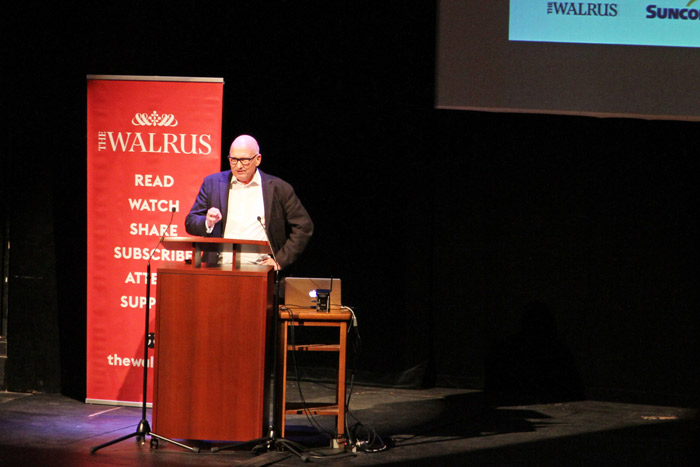As one of the top five oil and natural gas producing countries, Canada shapes the global conversation on the future of energy and the related issue of global climate change. At The Walrus Talks Energy, eight presenters from a variety of professions discussed Canada’s perspective in the global energy economy.
Christopher Ragan, McGill associate professor of Economics and chair of Canada’s Ecofiscal Commission, first presented his “five-nouns” key to a low-carbon world. “Order” and “unpredictability” were used to explain how the global market has short-term predictability in its price patterns, despite long-term unpredictability due to innovations and policy changes. Ragan used “transition” and “seduction” to describe how Canada must envision and encourage individuals to switch to a low-carbon market through regulations or subsidies.
“The final noun, which is ‘efficacy,’ is what kinds of policy can achieve the transition that we want and do it in a […] low cost way,” Ragan said.
Leah Lawrence, president and CEO of publicly-funded Sustainable Development Technology Canada, presented the role that small companies have in disrupting the status quo in the energy sector. She argued that small companies can be more motivated to introduce new innovations than traditional utility companies. Now that renewable energy is about to reach a peak, Lawrence believes it is the perfect time for smaller companies to enter the energy market.
General Electric Canada’s Vice President for government affairs and policy, Ross Hornby, explained the role of the democratization of electric power: New innovations such as small-scale wind turbines, run-of-the-mill hydropower, and photovoltaic solar have helped distribute energy closer to its location of generation. This helps remote communities and developing countries become less reliant on external energy sources. Having local renewable energy sources means more power to residents, stable jobs, and lower costs of electricity.
Deborah Yedlin, business columnist for The Calgary Herald, discussed the hypocrisy that certain people express when discussing their stance on non-renewable energy. Yedlin criticized Montreal Mayor Denis Coderre for protesting the Energy East pipeline while allowing sewage to be dumped into the Saint Lawrence River.
Tanya Barnaby, executive director for the Mi’gmawei Mawiomi Secretariat, spoke on wind energy’s role in the empowerment of the Mi’gmaq, a First Nations territory in Gaspesie.
“We are building a wind farm […] to be self-sufficient,” Barnaby said. “Our end goal is to generate revenues that will fund our own governments.”
The Mi’gmaq prioritized building the wind farm in an eco-friendly and cost-efficient way. The wind-farm will add a level of self-sufficiency for the Mi’gmaq, in addition to providing 100 new jobs.
Jane Kearns, senior advisor for MaRS Cleantech—a private company specializing in services for energy entrepreneurs, delved deeper into Canadian small business innovators. She discussed companies such as Morgan Power, which provides low-cost solar panels, and General Fusion, a Burnaby-based company trying to develop fusion as a source of energy.
Nicholas Parker, of Global Acceleration Powers—a financial company dedicated to developing energy alternatives, explained the opportunity Canada currently has in China.
“[Canada is] losing global market share in terms of clean tech exports […] and yet, we have institutions […] which are incubating Canadian companies which are now ready for primetime,” Barnaby said. “China can help solve problems that we have [and] problems that they have.”
Last to speak was McGill Professor of Management Studies Henry Mintzberg, who focused on how we use energy rather than how we produce it.
“I think the problem of climate change has been significantly caused by the imbalance of society between business, government, and […] civil society,” Mintzberg said. “Business […and] government [have] to contribute to the solution of this problem. The plural sector has to contribute to a wake-up call that says this problem goes beyond business—this problem is caused largely by how we’ve been living.”








